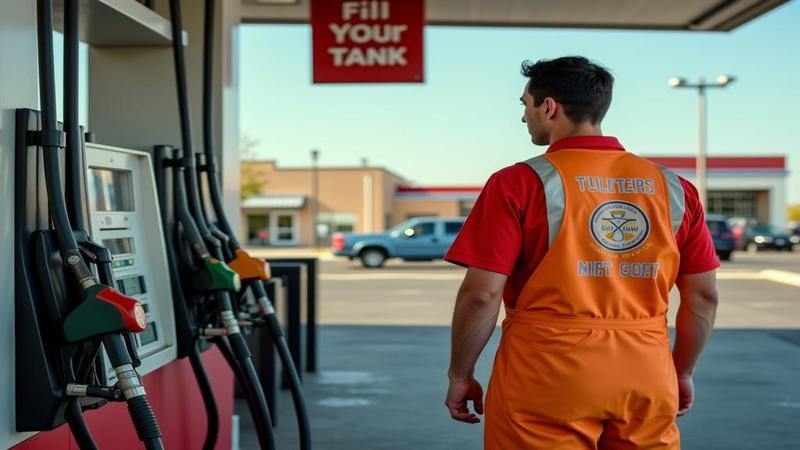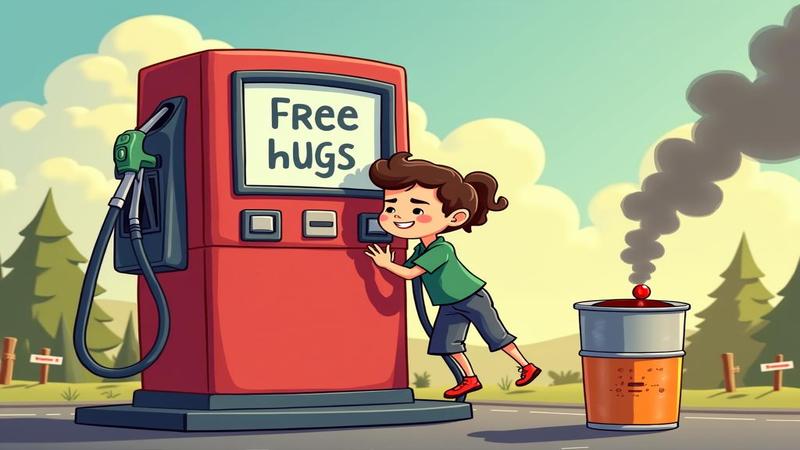Fuel Fallout Leaves Cars in Therapy, Pumps on Strike

Fuel fallout has the nation waking up to the scent of sludge and optimism. Officials insist this is a temporary hiccup, a hiccup paid for by the ancient concept of market equilibrium and the even older concept of ‘we’ll fix it later.’
Gas stations report lines that snake like a runway for a very tired marathon, and coffee shops have started selling loyalty cards that offer a free latte if you actually arrive on foot.
Economists warn of cascading effects that go beyond petrol: mood swings, delayed deliveries, and a suspicious uptick in ‘emergency’ brunch orders. The national mood is currently powered by the last inch of gasoline in the world and a playlist of panic-buying memes.
Politicians scrambled to reassure citizens while promising a plan that will be unveiled after the next press conference, which is usually scheduled for sometime between ‘soon’ and ‘never.’ The public remains hopeful, mainly because hope is the only thing that still comes in a lead-free container.
Public transit ridership spikes as drivers admit they enjoy the feeling of being squeezed into buses of destiny. Cyclists, meanwhile, wear helmets adorned with silk scarves and clip-on air fresheners, turning commuting into a fashion statement.
Retailers pivot to fuel-themed merch, from bumper-sticker motivational quotes to commemorative plastic funnels. The market, ever adaptable, treats scarcity as a product launch and calls it ‘limited edition scarcity.’
At the pumps, the digital displays now show inspirational quotes like, ‘Patience is a full tank.’ Security guards hand out safety ribbons that double as lanyards. The world goes on; the world goes slow.
A family inventories its car’s two remaining gallons and negotiates a treaty with the grocery store for a late-night pasta shortage subtext. The kids practice whispering ‘may I please have some fuel?’ to the hamster.
Cafes respond by offering ‘gas-free zones’ where patrons can pretend they’re on a beach vacation without the fumes. The new script for everyday life: inhale, exhale, and pretend the price is just a suggestion.
Meanwhile, consumers online flood marketplaces for containment solutions as if the apocalypse were sponsored by a hardware store. They browse for a ‘gasoline spill kit’ and pretend the problem comes with a neat, tidy package.
Authorities hold a televised briefing that lands with all the grace of a spilled can on a calm lake. They demonstrate a new protocol that involves humming while checking the fuel gauge and then maybe taking a walk.

Experts admit they are baffled, but not baffled enough to stop wearing lab coats with cartoon oil stains. They propose ‘behavioral planning’ where people plan to be surprised and pleasantly surprised at the same time.
On the street, baristas begin offering ‘fuel-inspired’ pastries, a croissant shaped like a gas pump and a latte that tastes vaguely like ethanol, if you concentrate very hard.
Stocks in refiners wobble as traders attempt to pronounce ‘supply chain’ without grimace. A cheerful press release promises ‘crisis optimization’ and jokes about turning gas stations into solar-powered bookstores.
Comedians write material about the irony of ‘alternatives’ that all require electricity to harvest. A cartoon shows a pump handing a receipt to a long line that stretches into a mystical horizon.
Tech startups tout apps that claim to map the shortest path to a gas station, but the route often ends at a museum exhibit about oil spills. The public cheers for the app while realizing the map is mostly abstract art with arrows.
Scientists publish a paper on the ‘gallons of patience’ unit, arguing that endurance can be measured in cruise-controlled sighs. The peer review consists of a chorus of people sighing in unison and nodding slowly.
Shoppers flood pages for a ‘no spill fuel can’ that promises to end drama with a twist of satire. The product descriptions range from practical to poetically inspirational, and no one knows which is more dangerous.
Meanwhile, comedians host talk shows where the host drinks decaf coffee and the audience gasps at every coupon clip. The guests discuss how to grocery shop with a tank of gas.
A senior citizen offers a life lesson: ‘If you can’t fill up today, fill your sense of humor instead.’ The crowd applauds the wisdom that only a shortage could inspire.
By the time the smoke clears, citizens will have learned to adapt: carpool karaoke becomes carpool diplomacy and lane-striped traffic becomes modern sculpture.
In the end, the nation sighs with a whiff of gasoline and a shared snooze button, ready for the next unpredictable chapter in the saga of fuel.
